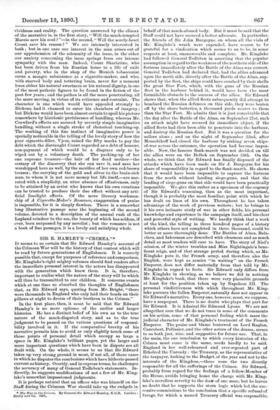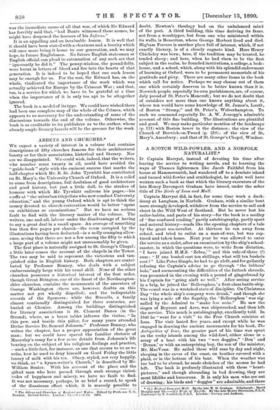SIR E. HAMLEY'S "CRIMEA."* IT seems to us certain that
Sir Edward Hamley's account of the Crimean War will be the history of that contest which will be read by future generations of Englishmen. It is scarcely possible that, except for purposes of reference and comparison, Mr. Kinglake's eight mighty volumes should find readers after the immediate personal interest in the actors has disappeared with the generation which knew them. It is, therefore, important to realise what the nature of the story will be which will thus be transmitted to our children. It concerns events which at one time so absorbed the thoughts of Englishmen that, as Sir Edward says, quoting from Mr. Bright, "there were thousands in England who only laid their heads on their pillows at night to dream of their brethren in the Crimea."
In the first place, then, it must be said that Sir Edward liamky's is no mere epitome of the earlier and larger histories. He has a distinct belief of his own as to the true nature of the much-disputed story, and as to the true judgment to be passed on the various questions of responsi- bility involved in it. If the comparative brevity of his narrative permits him to avoid or only slightly touch some of those points of personal detail which occupy so large a space in Mr. Kinglake's brilliant pages, yet the larger and more important questions which have been in dispute are all dealt with. On the whole, it seems to us that Sir Edward takes up very strong ground in most, if not all, of those cases in which he disputes the conclusions which have hitherto passed current as history. Overtly, and in express terms, he challenges the accuracy of many of General Todleben's statements. In- directly, he suggests modifications of not a few of Mr. King- lake's somewhat impassioned judgments.
It is perhaps natural that an officer who was himself on the Staff during the Crimean War should take up the cudgels in
! The War in the Crimea. By General Sir Bdward Hamley, H.O.B. London : Seeley and Co. 1801.
behalf of that much-abused body. But it must be said that the Staff could not have secured a better advocate. In particular, the friends of Sir John Burgoyne, on whom all the vials of Mr. Kinglake's wrath were expended, have reason to be grateful for a vindication which seems to us to be, in some respects at least, unanswerable and complete. Mr. Kinglake had followed General Todleben in asserting that the popular assumption in regard to the weakness of the northern side of the fortress immediately after the Battle of the Alma was correct. General Todleben had declared that, had the allies advanced upon the north side, directly after the Battle of the Alma, sup- ported by the fleet, the ships could have crashed by their shells the great Star Fort, which, with the guns of the Russian fleet in the harbour behind it, would have been the most formidable obstacle to the success of the allies. Sir Edward shows that, when the allied fleets subsequently did attempt to bombard the Russian defences on this side, they were beaten off by the shore batteries, a thousand yards nearer to them than the Star Fort. He admits that it is just conceivable that the day after the Battle of the Alma, on September 21st, such an attack might have secured its immediate object, if the allied fleets had then been able to penetrate into the harbour, and destroy the Russian fleet. But it was a question for the sailors alone ; and on the night of September 22nd, after Menschikoff had closed the harbour by sinking seven ships- of-war across the entrance, the operation had become impos- sible. Now, the famous flank-march was not decided on till the allies were on the Belbek on September 24th. On the whole, we think that Sir Edward has finally disposed of the attacks which have been made on Sir J. Burgoyne for his share of responsibility in regard to the flank-marMi. He shows that it would have been impossible to capture the fortress from the north without landing siege-guns, and that the landing of siege-guns on that side would have been practically impossible. We give this rather as a specimen of the cogency of Sir Edward's reasoning, than as the most important, though it is probably the most familiar, point with which he has dealt on lines of his own. Throughout he has taken advantage of the work of previous writers ; but he brings to it his own intimate study of war in other fields, his personal knowledge and experience in the campaign itself, and his clear and powerful style of writing. We hardly think that a work of the kind, the telling in three hundred pages of a history which others have not completed in three thousand, could be better or more thoroughly done. The Battles of Alma, Bala- clava, and Inkerman are described with clearness and as much detail as most readers will care to have. The story of Niel's mission, of the winter troubles and Miss Nightingale's bene- ficent reign, and of that strange period during which, as Mr. Kinglake puts it, the French army, and therefore also the English, were kept as armies "in waiting" on the French Emperor, does not differ materially from that told by Mr. Kinglake in regard to facts. Sir Edward only differs from Mr. Kinglake in showing, as we believe we did in noticing Mr. Kinglake's book, that there were very plausible grounds at least for the position taken up by Napoleon III. The personal vindictiveness with which throughout Mr. King- lake pursues the fallen Emperor, naturally does not appear in Sir Edward's narrative. Every one, however, must, we suppose, have a scapegoat. There is no doubt who plays that part for Sir Edward. It is Admiral Sir Edmund Lyons. We are not altogether sure that we do not trace in some of the comments on his action, some of that personal feeling which mars the judicial character of Mr. Kinglake's treatment of the French Emperor. The praise and blame bestowed on Lord Raglan, Canrobert, Pellissier, and the other actors of the drama, seems to us both just, wise, and suggestive for future use. That, in the main, the one conclusion to which every historian of the Crimea must come is the same, needs hardly to be said. England in her well-rehearsed and ever-repeated part of Ethelred the Unready ; the Treasury, as the representative of the taxpayer, looking to the Budget of the year and not to the interests of the Kingdom, these were the two directly responsible for all the sufferings of the Crimea. Sir Edward, probably from regard for the feelings of a fellow-Member of the House, avoids bringing home the charge with Mr. King- lake's merciless severity to the door of one man; but he leaves no doubt that he supports the stern logic which led the suc- cessive commissions to the conclusion that a specific refusal of forage, for which a named Treasury official was responsible,
was the immediate cause of all that woe, of which Sir Edward has forcibly said that, "had Dante witnessed these scenes, he might have deepened the horrors of his Inferno."
It is an appalling and an invaluable lesson. It is well that it should have been stated with a clearness and a brevity which will once more bring it home to our generation, and, we may hope, to future Englishmen. No future English statesman or English official can plead in extenuation of any such act that " ignorantly he did it." The penny-wisdom, the pound-folly, were burnt in letters of blood and fire into the hearts of that generation. It is indeed to be hoped that one such lesson may be enough for us. For the rest, Sir Edward has, on the whole, vindicated the importance of the work which was actually achieved for Europe by the Crimean War ; and that, too, is a service for which we have to be grateful at a time when the importance of it is only too apt to be altogether ignored.
The book is a model of its type. We could have wished there had been one complete map of the whole of the Crimea, which appears to us necessary for the understanding of some of the discussions towards the end of the volume. Otherwise, the book is as creditable to its publishers as to the author, whose already ample literary laurels will be the greener for the work.











































 Previous page
Previous page